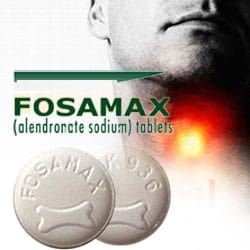
A new study of adverse event reports involving Fosamax and other bisphosphonates has found that the risk of esophageal cancer associated with these drugs may be higher than first thought. A study abstract published in advance of this week’s annual meeting of the American Society of Clinical Oncology also reports that the esophageal cancer risk […]
 A new study of adverse event reports involving Fosamax and other bisphosphonates has found that the risk of esophageal cancer associated with these drugs may be higher than first thought. A study abstract published in advance of this week’s annual meeting of the American Society of Clinical Oncology also reports that the esophageal cancer risk appeared disproportionate with Fosamax.
A new study of adverse event reports involving Fosamax and other bisphosphonates has found that the risk of esophageal cancer associated with these drugs may be higher than first thought. A study abstract published in advance of this week’s annual meeting of the American Society of Clinical Oncology also reports that the esophageal cancer risk appeared disproportionate with Fosamax.
According to a report from MedPage Today, a research team led by Beatrice J. Edwards, MD, of Northwestern University in Chicago, searched the U.S. Food & Drug Administration’s (FDA) adverse event reporting system (AERS) for terms related to esophageal cancer in combination with all drug names for bisphosphonates over the period from 1996 to 2010. The search revealed that 128 cases of bisphosphonate-associated esophageal cancer were reported during that time period. Fosamax accounted for 75% of the esophageal cancer reports, with a total of 96 cases reported. Fourteen cases were associated with Actonel, 10 with Boniva, seven with zoledronic acid (Zometa/Reclast), and one with Aredia.
In 2009, the FDA said that it had received only 23 reports of esophageal cancer associated with Fosamax, but no reports in relation to other drugs, according to MedPage. However, 31 cases of the disease had been reported overseas with Actonel, Boniva, and Didronel.
“Our analysis of FDA AERS identifies a larger number of cases of esophageal cancer than previously described, and a significant safety signal with alendronate (Fosamax) use,” the study authors wrote. “Increased awareness and vigilance is needed for patients receiving oral bisphosphonate therapy.”
The authors also noted that in three cases, Barrett’s esophagus, a risk factor for esophageal cancer, was also listed. According to MedPage Today, this led them to recommend that use of oral bisphosphonates be avoided in patients with the condition, as well as those with persistent mucosal abnormalities.
Bisphosphonate Overview
Bisphosphonates are approved to treat osteoporosis and other bone weakening disease. The drugs, which are taken by roughly 5 million people, are sold under a variety of brand names, including:
The labels for bisphosphonates have been updated several times in the past to warn of serious side effects, including Osteonecrosis of the Jaw (ONJ) and atypical thigh fractures
Last summer, the FDA issued a Drug Safety Communication to update the public on its ongoing review of the possible association between oral bisphosphonate drugs and an increased risk of cancer of the esophagus (esophageal cancer). At the time, the agency noted that the two studies it reviewed had reached conflicting conclusions. While the FDA said it believed the benefits of bisphosphonates continued to outweigh their risks, it acknowledged that further study of the issue was needed. Its safety review is ongoing.


